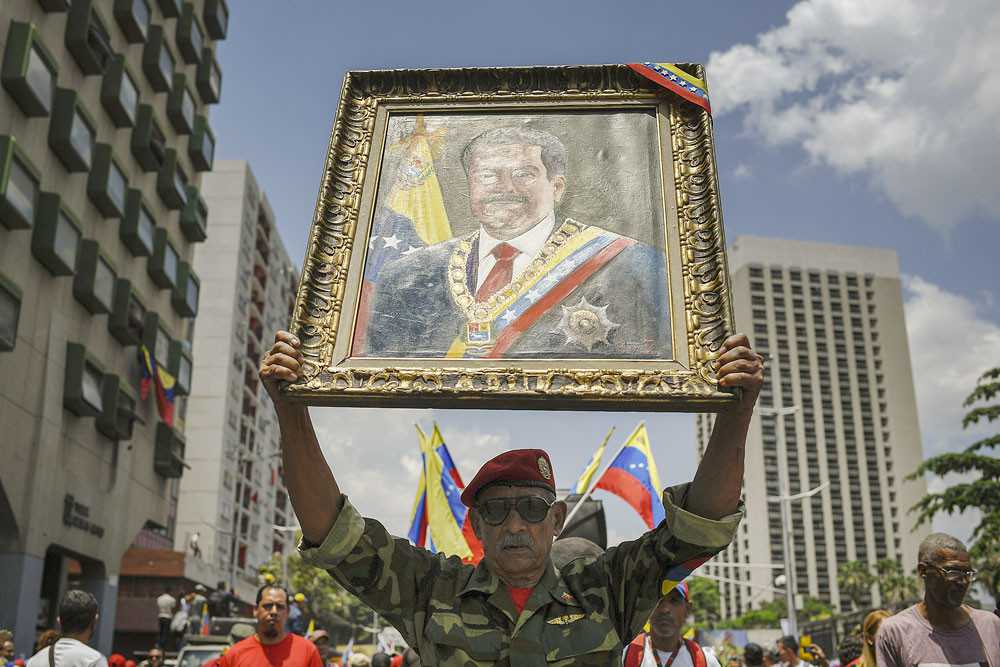How will US bounty affect Maduro's hold on Venezuelan power?
29 March, 2020

AMERICA ramped up the pressure on Venezuelan President Nicolas Maduro this week by accusing him of "narco-terrorism" and supplying a $15 million bounty for information resulting in his capture.
It is the latest in a succession of measures to force Maduro from power in favor of Venezuela's opposition leader Juan Guaido.
But though analysts said the move could pressure the regime, they were also skeptical it will achieve either the required effect or a finish south American country's long-running economic and political crises.
Fracturing the leadership
The huge amount of money offered in reward by the united states Justice Department are targeted at encouraging divisions among the command structures in the Maduro regime, authorities say.
"It's a casino game of billiards... you put the ball in play, hit it against others and those balls hit others, producing reactions," said political scientist Luis Salamanca.
He said it "sets a ball in motion in the circles of power" that could create internal divisions.
Trying to sew divisions has been among Guaido's main aims since January 2019 when he used his position as National Assembly speaker to declare himself acting president in a direct challenge to Maduro's authority.
Despite being acknowledged by a lot more than 50 countries, he's failed to make any significant headway.
Maduro retains the support of the powerful military -- backed by allies China, Russia and Cuba -- and control of state resources increasingly under great pressure from US sanctions.
"Both the US and Guaido have failed within their efforts to undermine Maduro's power base," said Peter Hakim, president emeritus of the Washington-based Inter-American Dialogue think tank.
"It is impossible at this stage to produce a serious prediction about whether this time around changes," although he acknowledged it could "put added pressure and pressure on the Maduro government and the army."
But political scientist Ricardo Sucre believes this pressure is more likely to unite the leadership instead of fragment it.
Military factor
Washington's overtures have mostly been to the Venezuelan military in a bid to sever their ties with Maduro, who repeatedly claims he's the prospective of attempted coups.
"They've gone from trying to make a crack through threats, to purchasing a crack ... they're seeking to see if someone will sell out Maduro," said Sucre.
The military remain, outwardly at least, loyal to the leader and once again on Friday reiterated their "unwavering commitment" to Maduro when confronted with "extravagant and extremist accusations."
Maduro has already bought their loyalty, providing the military with ample political and economic power in a country whose economy has crumbled, forcing millions of ordinary Venezuelans to flee.
He is definitely able to rely on that military support, including during mass street protests against his rule in 2014 and 2017 when violent crackdowns left around 200 people dead, and an attempted uprising by Guaido in April 2019.
Negotiations unlikely
But with the coronavirus pandemic inflicting the most recent crisis in a country already experiencing six years of recession and hyper-inflation which has decimated salaries and savings, some in the opposition have muted the likelihood of entertaining negotiations with Maduro.
"Maduro's indictment makes such negotiation even more unlikely since it materially escalates the exit costs for Maduro and other key officials," said Risa Grais-Targow of the Eurasia Group, a political risk consultancy.
Previous attempts to negotiate have previously stumbled on an opposition demand flat out rejected by the president -- that Maduro resigns so new elections could be held.
Panama precedent
Maduro is only the next sitting foreign leader to be indicted by the united states, after Manuel Noriega in 1989. Washington invaded the Central American country and captured him.
However, "this level of belligerence is quite unlikely in the case of Venezuela," according to Hakim.
"Most Latin American and Europe would be in opposition, and because Maduro has allies like China and Russia, which Noriega never really had."
There is another major consideration, too: the united states presidential election towards the end of the year.
"A lot of Trump's Venezuela policy has been guided by his electoral considerations in Florida, an integral swing state, where Cuban-American and Venezuelan-American voters are a significant constituency," said Grais-Targow.
Piling on economical pressure throughout a humanitarian crisis could possibly be viewed as "exacerbating the crisis" and "pushing too much can start to shift such support."
Source: www.thejakartapost.com
